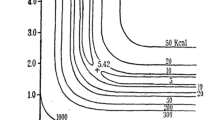Abstract
The problem of complexity is considered within the framework of concepts developed in recent studies in the philosophy of chemistry. According to previously expressed ideas about diminishing interactions (Vančik, 1999), as well as on the basis of the concept of levels of complexity, we speculate here that the complexity should approach its final limit. On the other hand, dynamical complexity may grow ad infinitum, and relativistic effects can only limit it. Impacts of these considerations on a possible change of actual paradigm of cosmology, especially on the anthropic principle, are also discussed.
Similar content being viewed by others
REFERENCES
D. Babić, 2000, personal communication.
B. Carter, Confrontation of Cosmological Theories with Observation. Dordrecht: Reidel, 1974.
J.E. Earley, Sr., Modes of Chemical Becoming, Hyle 4: 106, 1998.
J.E. Earley, Sr. Varieties of Chemical Closure. Annals New York Academy of Sciences, 1999, p. 122.
J. Horgan, The End of Science. New York: Broadway Books, 1997.
P. van Inwagen, Material Beings. Ithaca: Cornell University Press, 1990.
W.B. Jensen, Logic, History, and the Chemistry Textbook. Does Chemistry Have a Logical Structure? J. Chem. Ed. 75: 679, 1998.
C. Jenson and W.L. Jorgensen, J. Am. Chem. Soc. 119: 10846, 1997.
S. Kauffman, At Home in the Universe. Oxford University Press, 1995; Penguin Books, 1996.
K. Lorenz, Die Rückseite des Spiegels. Versuch einer Naturgeschichte menschlichen Erkentnis. München, Zürich: Piper & Co. Verlag, 1988.
K. Mainzer, Thinking in Complexity. Berlin: Springer Verlag, 1994.
I. Malnar, K. Humski and O. Kronja, Hammett r+ Values as Kinetic Evidence for the Concerted Biomimetic Bicyclization Mechanism, J. Org. Chem. 63: 3041, 1998.
L. McIntyre, The Emergence of the Philosophy of Chemistry, Found. of Chem. 1: 57, 1999.
H. Primas, Chemistry, Quantum Mechanics and Reductionism. Berlin: Springer, 1983.
P.J. Plath, Jenseits des Moleküls. Braunschweig, Wiesbaden: Vieweg & Sohn, 1997.
G. Del Re, Ontological Status of Molecular Structure, Hyle 4: 81, 1998.
A. Robertson, A.J. Sinclair and D. Philp, Minimal Self-Replicating Systems, Chem. Soc. Rev. 29: 141, 2000.
E.R. Scerri, It All Depends What You Mean by Reduction, in K. Mainzer, A. Müller and W.G. Salzer (Eds.), From Simplicity to Complexity. Vieweg Verlag, 1994.
E.R. Scerri and L. McIntyre, The Case of the Philosophy of Chemistry, Synthese 111: 213, 1997.
H.A. Simon, The Sciences of the Artificial, 3rd edn. Cambridge, MA: MIT Press, 1999.
H. Vančik, Opus Magnum: An Outline for the Philosophy of Chemistry, Found. of Chem. 1: 241, 1999.
S. Weinberg, Dreams of a Final Theory. London: Vintage Books, 1993.
Author information
Authors and Affiliations
Rights and permissions
About this article
Cite this article
Vančik, H. Philosophy of Chemistry and Limits of Complexity. Foundations of Chemistry 5, 237–247 (2003). https://doi.org/10.1023/A:1025656727195
Issue Date:
DOI: https://doi.org/10.1023/A:1025656727195




